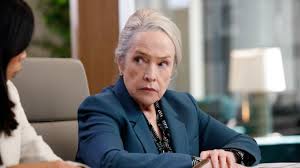
The gavel’s sharp rap once heralded the familiar, comforting silhouette of a silver-haired legal eagle, a Southern gentleman with a disarming drawl and a penchant for plaid suits and hot dogs. This was Ben Matlock, brought to life by the inimitable Andy Griffith, a figure synonymous with a particular brand of television justice. Yet, as the legal landscape of our screens evolves, so too must its heroes. The journey from Griffith's folksy sage to a hypothetical, sharper-edged Matlock embodied by Kathy Bates in 2025 is not merely a gender swap; it's an illustrative arc of how television has matured, embracing complexity, grit, and a more nuanced understanding of justice.
Andy Griffith’s Ben Matlock was a masterclass in underestimation. Dressed in his slightly rumpled plaid suits, speaking in gentle parables, he seemed a relic of a simpler time, an easy mark for slick, city-bred prosecutors. This was his genius. He cultivated an air of folksy innocence, only to unleash a razor-sharp intellect in the courtroom, peeling back layers of deception with meticulous detail until the real culprit was exposed in a dramatic, often theatrical, reveal. His pursuit of justice was rooted in moral clarity, a black-and-white world where good triumphed over evil, and the courtroom was a stage for definitive truth. Matlock wasn't just a lawyer; he was a moral compass for an era of comfort television, a reassuring presence that ensured wrongs would be righted, usually by the last commercial break. His impact was less about legal procedure and more about the psychology of the reveal, making the audience feel smart and satisfied.
Fast forward to the streaming era, to a world steeped in true crime documentaries, prestige dramas, and legal thrillers that revel in moral ambiguity. The neat bows and definitive answers of the Matlock era feel, at times, quaint. Audiences now crave complexity: flawed heroes, systemic injustices, and a justice that isn't always easily won. The theatricality of a single, climactic reveal can feel less authentic than the slow burn of investigative grind or the brutal reality of a flawed system. The need for a "Matlock" remains – the champion of the underdog, the underestimated genius – but the packaging and the presentation demand a profound reinvention.
Enter Kathy Bates, a powerhouse of an actress whose very presence suggests layers of lived experience, salty wit, and unflinching intensity. Imagine her as Brenda "Bren" Matlock, a character for 2025. This Matlock wouldn't rely on folksy charm to disarm her opponents; she’d use a different kind of weapon: a weary cynicism that barely masks a ferocious intellect, an acerbic wit that cuts through pretense, and an ability to project an almost bored indifference that belies her razor-sharp focus. Her plaid suits would be replaced by practical, slightly rumpled but perfectly tailored ensembles, hinting at a woman who prioritizes comfort and function over antiquated formality. Her hot dogs might be swapped for a strong coffee or a stiff drink, enjoyed alone while poring over case files in a dimly lit, cluttered office in a bustling, perhaps grittier, city.
The evolution from Andy Griffith’s Matlock to Kathy Bates’s would be illustrative in its contrasts and continuities. Griffith’s Matlock would subtly prod and maneuver, guiding witnesses with gentle questions until they tripped over their own lies. Bates’s Matlock would likely employ a more direct, almost confrontational style, her eyes missing nothing, her voice capable of both a comforting warmth and a chilling steel. She wouldn't play dumb; she'd play unimpressed, making her opponents underestimate her not for her folksiness, but for her apparent lack of grandstanding, her refusal to engage in courtroom theatrics. Her "aha!" moment might not be a dramatic accusation, but a quiet, devastating question that forces a confession, or a concise, irrefutable summation of evidence delivered with a gravitas that leaves no room for doubt.
The core essence of Matlock—the champion of the wrongly accused, the one who sees the truth others miss, the legal mind that outwits the powerful—would remain. But in Bates’s hands, this Matlock would grapple with a world where justice is harder to define, where the lines between right and wrong are blurred, and where systemic issues are as much the antagonist as any individual criminal. Her cases might involve corporate malfeasance, political corruption, or the fight for marginalized communities against an unfeeling bureaucracy. She wouldn't just be proving innocence; she'd be exposing the cracks in the system.
From Andy Griffith's comforting archetype to Kathy Bates's formidable, nuanced interpretation, the evolution of Matlock into 2025 serves as a powerful illustration of television's capacity for reinvention. It demonstrates how enduring character archetypes can be reshaped by the sensibilities of their time and the transformative power of a truly great actor. The plaid suit might be gone, the hot dogs exchanged for something more fitting, but the quest for truth, delivered with an unexpected punch, remains as compelling as ever.
